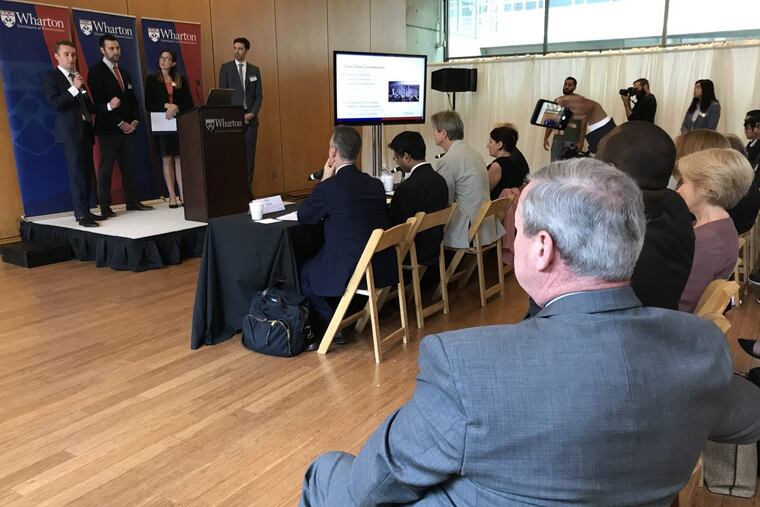Wharton teams imagine what it would take to lure Amazon
Students at the University of Pennsylvania's school are the latest group to try their hand at swaying Amazon to pick Philadelphia for its new corporate campus.

Give them credit: They've really thought about what it might take to get Amazon to put its second headquarters in Philadelphia.
No, really, give them credit. They're doing it for school.
After local business and technology leaders, economists, and newspaper columnists, business students at the University of Pennsylvania's Wharton School are the latest group to try their hand at swaying Amazon.com Inc. to pick Philadelphia for its new corporate campus.
In the Amazon HQ Case Competition judged by Wharton faculty Friday, teams of students mocked up proposals to the e-commerce giant that they hoped would rocket Philadelphia to the top of the company's site-selection list. It was held as Philadelphia officials prepare to make their real-life pitch to Amazon during the company's window for submissions, Monday through Thursday.
"If Amazon came here, it would attract so many other tech companies," said Wharton undergrad Tanmay Chordia, whose Team Delphi tied for first place in the competition by proposing a "smart city" artificial intelligence collaboration among Amazon, Comcast Corp., and city agencies.
Next week, Wharton will host an essay contest for students to pen their best argument for Philadelphia to be chosen for what's being nicknamed HQ2, where Amazon has said it will employ 50,000 full-time workers within millions of square feet of office space.
Penn isn't the city's only educational institution to be getting in on the Amazon-attraction act.
At Temple University, advertising-department chair Dana Saewitz has been coordinating with Mayor Kenney's office on the #PhillyIsPrime social media campaign, which aims to promote the city's appeal to the college-age cohort that Amazon will presumably target for recruitment post-graduation.
And at Drexel University, John Fry has been a stalwart promoter of the city's bid, both as that school's president and as chairman of the Greater Philadelphia Chamber of Commerce.
Philadelphia Commerce Director Harold Epps said this collaborative pursuit of the company already has lifted the city's confidence, as it sees itself as having a realistic shot at landing the retail behemoth.
That confidence could be bolstered by a Moody's Analytics report Thursday that ranked Philadelphia as North America's third-best metro area for the headquarters, after Austin, Texas, and Atlanta. Philadelphia shot to first place when geographic location was added to the criteria, Moody's said.
"No matter where we go, people say, 'Go get it,' " Epps said last week after joining a fact-finding delegation to Seattle aimed at refining the city's proposal. "They are believing that we have a chance."
In addition to a warm welcome, Epps said, Philadelphia would offer Amazon an abundance of schools and research institutions — such as Penn, Temple, and Drexel — to recruit from and collaborate with, a convenient and far-reaching transit network, and the availability of huge tracts of centrally located land under single ownership where the company can build out a headquarters campus over many years.
Another of Philadelphia's selling points could be something it doesn't have: the 500,000-plus residents it shed between the 1950 and the mid-2000s, which leaves plenty of room for a company like Amazon to grow its workforce without straining traffic grids and living expenses, as it's done in its native Seattle.
"The bad news is, Philadelphia used to have two million people, it's got 1.6 million now," Epps said. "The good news is it has the infrastructure in place" to support more growth.
Also adding to Philadelphia's allure is the vast network of surrounding cities and suburbs that could support development that accompanies the growth of a new headquarters campus, officials said.
Some of those spots, however, have their own headquarters bids in mind.
Across the Delaware River, Camden is said to be one of four New Jersey cities — along with Newark, Jersey City, and New Brunswick — that the state plans to pitch in its proposal to the company, business news site ROI-NJ reported earlier this month.
Atlantic and Gloucester Counties have said they plan pitches of their own.
Delaware state officials, meanwhile, said in a joint announcement last month with representatives of Wilmington and New Castle County that they plan a proposal.
Within Pennsylvania, Bensalem Township, Bucks County, says it wants Amazon to take part of a 675-acre riverfront tract of mostly undeveloped land for the headquarters. Delaware County officials are said to have a proposal in mind as well but have disclosed no potential locations, according to Matt Cabrey, executive director of the Greater Philadelphia Chamber of Commerce's business-retention affiliate, Select Greater Philadelphia.
At the Wharton Amazon HQ Case event Friday, Commerce Department chief of staff Sylvie Gallier Howard said the city may incorporate the best ideas from the competition in its official bid next week.
Also present at the event were Mayor Kenney and City Councilman Kenyatta Johnson, whose South Philadelphia district includes the Navy Yard office and industrial campus, which city officials are expected to include as a potential headquarters location in their pitch to Amazon.
Team Delphi member Ameya Shiva said his group's "smart city" proposal capitalizes on Philadelphia's clout in robotics research. Robotics is "a huge market for Amazon, as are autonomous drones, and we have that here," he said.
The proposal by Team Wharton Prime — which tied for first place in Friday's business case contest with Team Delphi — could be a harder sell for the city: $12.5 billion-$15 billion tax credit and free land.
But Johnson said he was open to the idea.
"$15 billion is big," he said. "But in the long run, it would pay off."